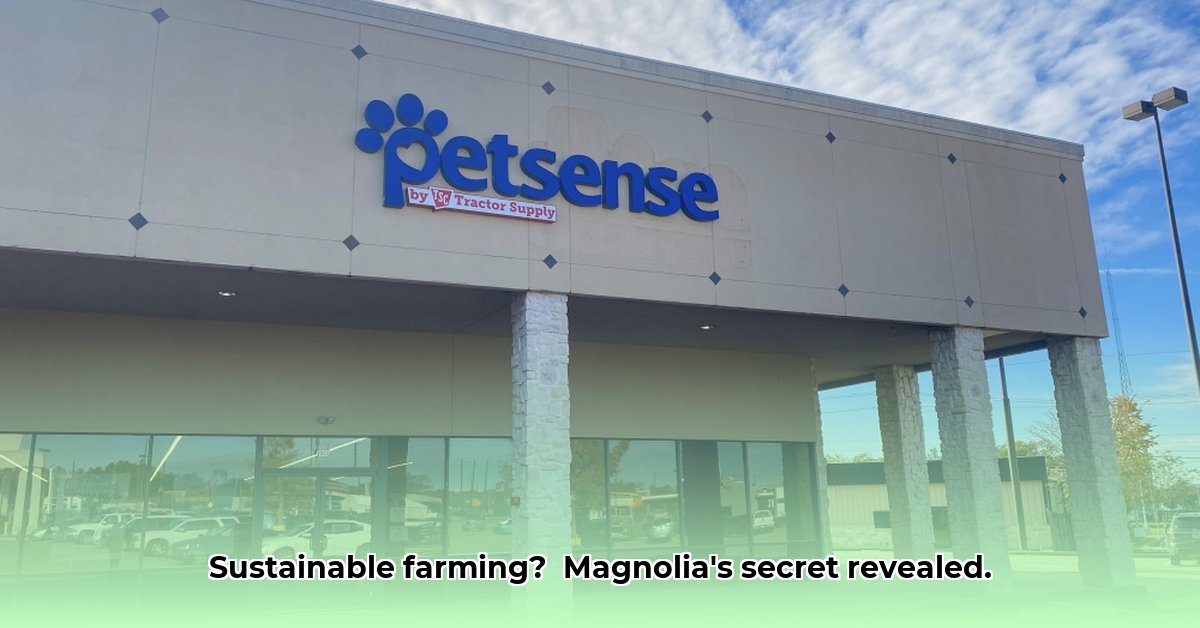
Magnolia's Strategic Location: A Rural Retail Lifeline
Tractor Supply stores serve as vital resources for rural communities, providing farmers with essential supplies. This case study examines the Magnolia, Texas, location to explore its potential contribution to sustainable agriculture. Its strategic placement within a geographically dispersed farming region suggests a significant, albeit currently unquantified, impact. Learn more about improving efficiency with autonomous farming technology. A map illustrating the distances between Magnolia and surrounding towns would visually reinforce the store's central role in serving a wide geographic area. [Insert map here]. The reduced transportation distances for farmers, compared to travelling to larger urban centers, are likely to reduce both fuel consumption and associated greenhouse gas emissions. However, direct evidence linking this reduced travel to specific sustainable farming practices remains absent.
The Impact on Sustainable Agriculture: A Story Still Unfolding
The potential positive effects of Magnolia Tractor Supply's accessibility are compelling, but their extent remains uncertain. Shorter distances likely translate to lower transportation emissions, a key aspect of sustainable agriculture. Increased access could also encourage the adoption of eco-friendly products, such as organic seeds or water-efficient irrigation systems. However, without data on specific product sales and their use in farming practices, the true impact remains largely speculative. This uncertainty highlights the limitations of anecdotal evidence and underscores the need for rigorous, data-driven analysis. How can we quantify the actual effect on sustainability?
Uncovering the Truth: Needed Research and Data Gaps
To determine Magnolia Tractor Supply's genuine impact, substantial research is needed. Currently, crucial data points remain elusive. What specific sustainable agricultural products are purchased? How are these products utilized in actual farming practices? Addressing these questions requires a multi-faceted approach:
Product Inventory Analysis: A detailed inventory of Magnolia Tractor Supply's products is necessary to assess the availability of sustainable options. This must include a quantification of organic seeds, water-saving irrigation equipment, and eco-friendly farming tools compared to conventional alternatives. This comparative data can be vital in understanding the store's commitment to sustainable products.
Customer Segmentation Studies: Understanding the customer base is paramount. Who shops at Magnolia Tractor Supply? Are they primarily organic farmers, conventional farmers, or a combination? Combining sales data analysis with customer surveys can reveal purchasing patterns and farming practices. Are there correlations between customer type and the adoption of sustainable practices?
Environmental Impact Assessment: A detailed assessment can quantify the reduction in transportation-related emissions due to the store's central location. This will offer a concrete measure of the store’s eco-friendly benefits.
Actionable Insights for All Stakeholders
Understanding Magnolia Tractor Supply's role requires collaborative action from multiple stakeholders. The short-term and long-term actions below highlight the responsibilities and potential contributions of each key group.
| Stakeholder | Short-Term Actions | Long-Term Actions |
|---|---|---|
| Tractor Supply Company | Analyze sales data to identify trends in sustainable product purchases. | Invest in expanding the range of sustainable agricultural products offered. |
| Local Farmers | Participate in surveys to provide feedback on product needs and availability. | Advocate for more sustainable product options from Tractor Supply and other retailers. |
| Local Government | Support initiatives promoting sustainable agriculture within the region. | Invest in infrastructure improvements (roads, broadband) to support efficient resource access. |
| Researchers | Conduct comprehensive studies to evaluate the impact of accessible retail infrastructure. | Publish findings to inform future policy and investment decisions in sustainable agriculture. |
Conclusion: The Path Forward
Magnolia Tractor Supply’s strategic location holds considerable promise for supporting sustainable agriculture in the region. However, a comprehensive understanding of its actual impact requires further research and data collection. The potential benefits, from reduced emissions to increased access to sustainable products, are significant but currently lack robust quantitative support. Collaborative efforts between researchers, Tractor Supply, farmers, and policymakers are essential to unlock the full potential of accessible retail infrastructure in promoting sustainable farming practices. Further research is crucial to provide a complete and accurate assessment of Magnolia Tractor Supply's influence on the agricultural community and the environment.